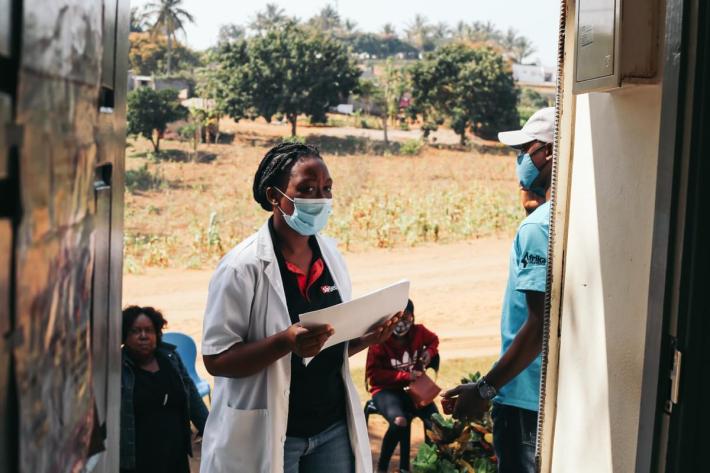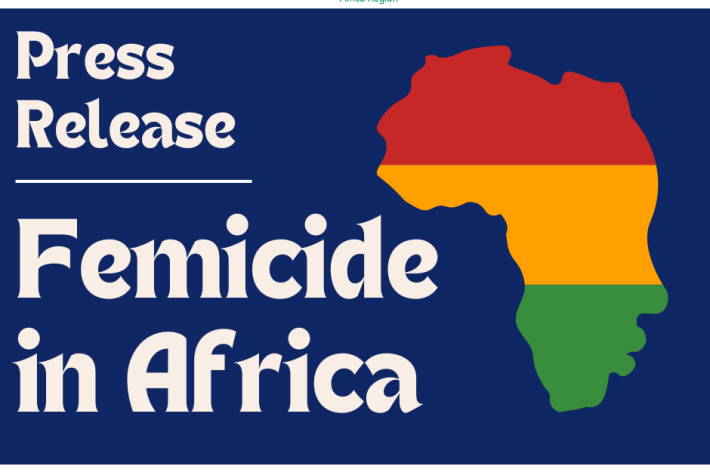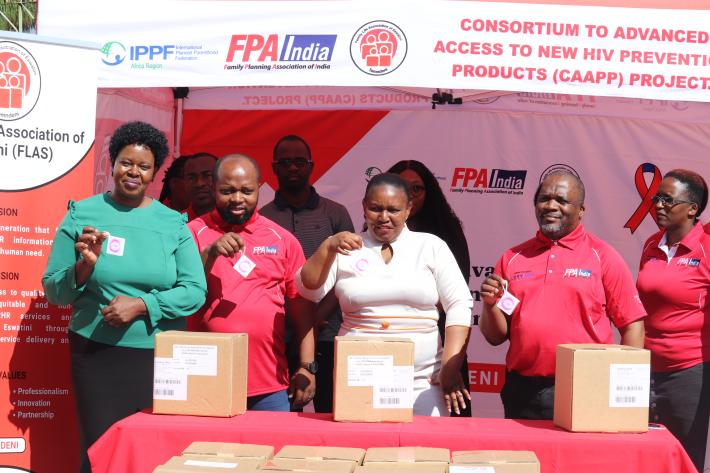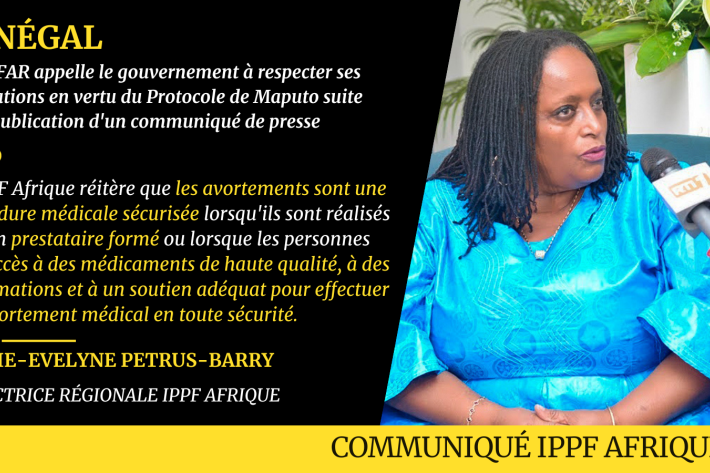Latest press releases
A selection of stories from across the Federation
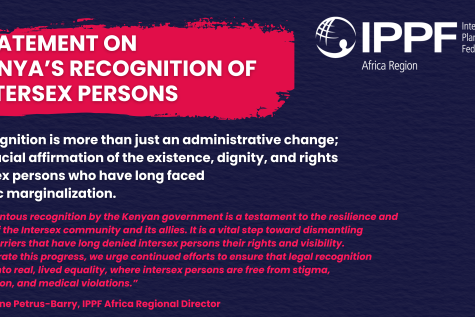
Kenya
IPPF Africa Region Welcomes Kenya’s Landmark Recognition of Intersex Persons
IPPF Africa Region Welcomes Kenya’s Landmark Recognition of Intersex Persons Nairobi, Kenya: 13 February 2025 – On 31 January 2025, Kenya has taken a groundbreaking step towards inclusivity and human rights by officially recognizing intersex as a sex marker alongside male and female in the Kenya Legal Notice 153 of 2025.


| 16 August 2023
Japanese MP visits IPPF Member Association in Mozambique
On 16 August 2023, Japanese House of Representatives member Dr Toshiko Abe visited head office and the Adolescent and Youth Friendly Services Centre of IPPF’s Member Association in Mozambique, the Associação Moçambicana para Desenvolvimento da Família (AMODEFA). Dr Abe visited one of AMODEFA’s eight youth centres in a particularly marginalised and high poverty density area, where youth friendly health services is difficult to reach for the local youth who need them most. Their youth centre functions as the hub of youth target activities such as provision of a range of services from HIV testing and treatment to SRHR counselling and other information and services around sexual health and rights. In 2022, 23.57 % of AMODEFA’s family planning services were provided to clients under 20 years. AMODEFA was established in 1989 and has been IPPF’s Full Member Association since 2010. It is an independent, non-profit, and non-governmental association working in 10 provinces in Mozambique. As the leading service provider in Mozambique, AMODEFA provides comprehensive and diverse sexual and reproductive health, including that related to SGBV. Their focus is on vulnerable people such as women, girls, people with disabilities.

| 11 July 2023
Igniting Conversations: Maputo Tea Campaign Raises Awareness of Women's Rights
As advocates for Women's Sexual and Reproductive Health Rights, it is essential to mark significant milestones that have helped shape and protect the rights of women. In this spirit, International Planned Parenthood Federation Africa Region (IPPFAR) is proud to introduce the Maputo Tea Party Campaign, commemorating the 20th Anniversary of the Maputo Protocol. This campaign aims to raise awareness among young people who may have been too young to grasp the significance of this pivotal document when it was first enacted. By initiating impactful conversations, the campaign strives to ensure that all women are aware of their rights as enshrined in the Maputo Protocol. The Protocol to the African Charter on Human and Peoples' Rights on the Rights of Women in Africa, better known as the Maputo Protocol, is an international human rights instrument established and adopted by the African Union in 2003 that went into effect in 2005. It guarantees comprehensive rights to women, including the right to take part in the political process, to social and political equality with men, improved autonomy in their reproductive health decisions, and an end to Female Genital Mutilation/Cutting. Creating Awareness and Igniting Conversations Through compelling storytelling, impactful visuals, and interactive elements, the campaign seeks to educate and empower the younger generation regarding their sexual and reproductive health rights. The power of social media lies in its ability to transcend borders and connect people across diverse communities. The campaign will leverage this potential to reach a wide audience, fostering a space for open dialogue, sharing experiences, and addressing the challenges faced by women in realizing their rights. By using the hashtag #maputoteaparty, the campaign aims to ignite conversations on platforms like TikTok, Instagram, Twitter, and Facebook, ensuring that the voices of young people resonate strongly. Key Objectives of the Campaign Awareness: By sharing the historical significance of the Maputo Protocol, the campaign aims to ensure that all women, especially young individuals, are aware of their rights, thereby empowering them to make informed decisions about their sexual and reproductive health. Education: Through informative and accessible content, the campaign will demystify the provisions of the Maputo Protocol, making it relatable and comprehensible to the younger generation. Advocacy: The campaign will encourage young individuals to become advocates for women's rights within their communities, urging them to take action and create positive change. Campaign Activities IPPFAR and RHNK hosted the Maputo Tea Party on Thursday 6th July 2023. The event was attended by over 75 guests and live-streamed to internal stakeholders across Africa. The team launched the #MaputoTeaParty digital campaign which includes social media content, influencer posts, and individual posts. The campaign started on Friday 7th July 2023 and will continue until 2nd August 2023. The hashtag #maputoteaparty trended on Twitter; on Tuesday 11th July 2023, from 7.30 am - 11.30 am, the hashtag reached number one on the trending list! The University Street Shoot took place on Tuesday, July 11th, 2023, from 10:00 am to 1:00 pm. The shoot aimed to assess students' awareness of the Maputo Protocol's 20th Anniversary and promote the campaign's message of "Got the Maputo Tea?" A total of 30 students shared responses. Together, let us foster a future where every woman can exercise her rights and live a life of dignity, equality, and freedom. The Maputo Tea Party Panel discussion video: https://youtu.be/SVDbASAHE3c

| 30 May 2023
IPPF Africa Condemns Uganda's Anti-Homosexuality Act as a Violation of Human Rights And Sexual And Reproductive Rights
Nairobi, Kenya: 30 May 2023 – The International Planned Parenthood Federation Africa Region (IPPFAR) is appalled and deeply disturbed by the recent enactment of the anti-homosexuality act 2023 by President Museveni of Uganda. This regressive law represents a grave violation of human rights and sexual and reproductive rights, affecting not only the LGBTIQ+ community but all Ugandans. The draconian and abhorrent provisions of this law criminalize same-sex relationships and any promotion of homosexuality, subjecting individuals to severe penalties, including life imprisonment. Its implementation will have dire consequences, fostering a climate of homophobia, hatred, and hate crimes. The law instills fear not only among those directly targeted and their families but also among health workers providing essential Sexual and Reproductive Health (SRH) services in Uganda. IPPFAR is extremely concerned that this law blatantly violates numerous human rights, including the right to bodily autonomy. The right to life and dignity, freedom of expression and association, protection from discrimination, the right to a fair trial, protection against arbitrary arrest, and access to health services are all undermined, compromising the full realization of sexual and reproductive health and rights. "The IPPF Africa region vehemently condemns the anti-homosexuality act 2023, which targets the LGBTIQ+ community and their allies in Uganda. This law marks a sorrowful day for Uganda and its people," stated Marie-Evelyne Petrus-Barry, IPPF Africa Regional Director. "Targeting a community based solely on their shared characteristics is extremely dangerous and an undeniable violation of human rights. Instead, we should strive to empower all members of our society to be positive contributors, rather than driving them into hiding and marginalization," Petrus-Barry added. Since March 2023, IPPF has witnessed a surge in physical attacks against the LGBTIQ+ community, threats to the safety of civil society organizations, and an alarming increase in hate speech targeting LGBTIQ+ individuals and their allies. The anti-homosexuality act 2023 is discriminatory and flagrantly violates the fundamental freedoms enshrined in the Uganda constitution. By isolating itself from the international community, Uganda risks alienating potential collaborators and donors. Already, the U.S. Government has expressed intentions to suspend development funding to Uganda, including through the U.S. President's Emergency Plan for AIDS Relief (PEPFAR) and the Global Fund and UNAIDs, potentially jeopardizing the progress in the fight against the HIV pandemic in Uganda. As the foremost provider of sexual and reproductive health (SRH) services in Africa, IPPFAR is immensely concerned that this law will deter individuals from seeking vital SRH services due to fear of being targeted. This will inevitably hinder access to life-saving services, including HIV/AIDS testing and treatment, provision of antiretroviral therapy, contraceptive services, and accurate SRH information. Moreover, the law obstructs healthcare professionals from fulfilling their duties and providing high-quality care in a safe and confidential environment. IPPFAR joins the chorus of condemnation against this harmful and regressive law. The safety, health, and dignity of all Ugandans must remain paramount. IPPF stands resolutely with the LGBTIQ+ community and their allies in Uganda and worldwide during this challenging time. END For further information or to request an interview, please contact: -Mahmoud GARGA, Lead Specialist - Strategic Communication, Media Relations and Digital Campaigning, IPPF Africa Regional Office (IPPFARO) – email: [email protected] / Tel: +254 704 626 920 ABOUT IPPF AFRICA REGION (IPPFAR) The International Planned Parenthood Federation Africa Region (IPPFAR) is one of the leading sexual and reproductive health (SRH) service delivery organization in Africa, and a leading sexual and reproductive health and rights (SRHR) advocacy voice in the region. Headquartered in Nairobi, Kenya, the overarching goal of IPPFAR is to increase access to SRHR services to the most vulnerable youth, men and women in sub-Saharan Africa. Supported by thousands of volunteers, IPPFAR tackles the continent’s growing SRHR challenges through a network of Member Associations (MAs) in 40 countries. We do this by developing our MAs into efficient entities with the capacity to deliver and sustain high quality, youth focused and gender sensitive services. We work with Governments, the African Union, Regional Economic Commissions, the Pan-African Parliament, United Nations bodies among others to expand political and financial commitments to sexual and reproductive health and rights in Africa. Learn more about us on our website. Follow us on Facebook, Twitter, Instagram and You Tube.

| 10 May 2023
Uganda: IPPF Africa Region Urges President Museveni to Veto Harmful New Anti-Rights Law Targeting LGBTIQ+ Community
Nairobi, Kenya: 10 May 2023 – On 2 May 2023, the Ugandan parliament once again passed a detrimental and dangerous anti-LGBTIQ+ law. This follows the revision of the March 2023 law, which was sent back to parliament by President Museveni for amendments, but still remains alarming. The law criminalises same-sex relationships, and the promotion of homosexuality with prison terms of up to a maximum of life imprisonment. Read IPPFAR’s previous statement here. IPPF Africa region (IPPFAR) remains extremely concerned about the violation of several international human rights that would be ushered in by this law, including the right to life and dignity, freedom of expression and association, protection from discrimination, the right to a fair trial, to protection against arbitrary arrest, and to access health services, thus compromising the full and complete attainment of sexual and reproductive health and rights. In March 2023, IPPFAR warned that the proposed anti-LGBTIQ+ law would send a dangerous message and encourage hatred. Unfortunately, since then, IPPF has noted an increase in physical attacks against the LGBTIQ+ community, threats to the safety and security of civil society organisations, and an increase in hate speech towards LGBTIQ+ individuals and their allies. As the leading provider of sexual and reproductive health (SRH) services in Africa, IPPFAR is deeply concerned that the passing of this law will deter people from accessing potentially life-saving SRH services for fear of being targeted, thereby detrimentally affecting access to the range of sexual and reproductive health and services in Uganda, including testing and treatment for HIV/AIDS and other sexually transmitted infections, the provision of antiretroviral therapy to HIV positive persons, contraceptive service utilisation and access to accurate SRH information. The law hinders clinicians and healthcare professionals from fulfilling their roles and providing high quality patient care in a safe and confidential environment. “The IPPF Africa region condemns the new anti-rights law targeting the LGBTIQ+ community in Uganda and urges President Museveni to veto it promptly. This law will undo progress made in Uganda with regards to sexual and reproductive health and rights and will place many Ugandans in danger and at risk of several human rights violations”, said Marie-Evelyne Petrus-Barry, IPPF Africa Regional Director. Once again, IPPFAR adds its voice to the widespread condemnation of this harmful and retrogressive law and urges President Museveni to veto it. The safety, heath, and dignity of all Ugandans must remain paramount. IPPF continues to stand with the LGBTIQ+ community in Uganda and globally at this time. END For further information or to request an interview, please contact: -Mahmoud GARGA, Lead Specialist - Strategic Communication, Media Relations and Digital Campaigning, IPPF Africa Regional Office (IPPFARO) – email: [email protected] / Tel: +254 704 626 920 ABOUT IPPF AFRICA REGION (IPPFAR) The International Planned Parenthood Federation Africa Region (IPPFAR) is one of the leading sexual and reproductive health (SRH) service delivery organization in Africa, and a leading sexual and reproductive health and rights (SRHR) advocacy voice in the region. Headquartered in Nairobi, Kenya, the overarching goal of IPPFAR is to increase access to SRHR services to the most vulnerable youth, men and women in sub-Saharan Africa. Supported by thousands of volunteers, IPPFAR tackles the continent’s growing SRHR challenges through a network of Member Associations (MAs) in 40 countries. We do this by developing our MAs into efficient entities with the capacity to deliver and sustain high quality, youth focused and gender sensitive services. We work with Governments, the African Union, Regional Economic Commissions, the Pan-African Parliament, United Nations bodies among others to expand political and financial commitments to sexual and reproductive health and rights in Africa. Learn more about us on our website. Follow us on Facebook, Twitter, Instagram and You Tube.

| 23 March 2023
Uganda: IPPF Africa Region strongly urges the government not to enact the new harmful anti – LGBTIQ+ law
Nairobi, Kenya: 23 March 2023 – On 21st March 2023 the Ugandan parliament approved a law which, if enacted, would criminalise people for identifying as a member of the LGBTIQ+ community. The proposed law has been through two readings in parliament and is awaiting a third before it is put forward to the President for Assent. If passed, it will be a gross violation of and undermine the human rights and safety of people identifying as LGBTIQ+ in Uganda. IPPF Africa Region is strongly concerned about the numerous ways in which the passing of this law will violate international human rights including the right to life and dignity, freedom of expression and association, protection from discrimination, and will compromise the full and complete attainment of sexual and reproductive health and rights. Additionally, IPPF is extremely concerned about the dangerous message the law sends. In addition to criminalising consent, it encourages hatred, may escalate violence and gender-based violence targeting persons from LGBTIQ+ communities, popular justice, hinders the right to a fair trial, makes it easier to target minority groups, and harder for them to access justice and redress for hate crimes. At a time when countries around the world and in Africa are decriminalising same sex relationships, this law, if passed, will be a serious step backwards for Uganda. "IPPF works to ensure the sexual and reproductive health and rights of all people regardless of their sexual orientation, gender identity and/or expression, and sex characteristics (SOGIESC) – including lesbian, gay, bisexual, trans, and intersex people – and ensure they have access to the full set of human rights enshrined in international human rights laws”, Said: IPPF’s Africa Regional Director, Marie-Evelyne Petrus-Barry. “IPPF is willing to work with the Ugandan Government and other stakeholders to ensure that all Ugandan people can access their sexual and reproductive rights without fear, discrimination, or restraint", added Petrus-Barry. IPPF strongly urges the President of Uganda to not sign off on this discriminatory law, uphold and safeguard the Universal Declaration and African Charter on Human Rights, and treat all Ugandans equally. IPPF stands with the LGBTIQ+ community in Uganda and globally at this difficult time. END For further information or to request an interview, please contact: -Mahmoud GARGA, Lead Specialist - Strategic Communication, Media Relations and Digital Campaigning, IPPF Africa Regional Office (IPPFARO) – email: [email protected] / Tel: +254 704 626 920 ABOUT IPPF AFRICA REGION (IPPFAR) The International Planned Parenthood Federation Africa Region (IPPFAR) is one of the leading sexual and reproductive health (SRH) service delivery organization in Africa, and a leading sexual and reproductive health and rights (SRHR) advocacy voice in the region. Headquartered in Nairobi, Kenya, the overarching goal of IPPFAR is to increase access to SRHR services to the most vulnerable youth, men and women in sub-Saharan Africa. Supported by thousands of volunteers, IPPFAR tackles the continent’s growing SRHR challenges through a network of Member Associations (MAs) in 40 countries. We do this by developing our MAs into efficient entities with the capacity to deliver and sustain high quality, youth focused and gender sensitive services. We work with Governments, the African Union, Regional Economic Commissions, the Pan-African Parliament, United Nations bodies among others to expand political and financial commitments to sexual and reproductive health and rights in Africa. Learn more about us on our website. Follow us on Facebook, Twitter, Instagram and You Tube.
| 23 March 2023
Ancrage de l’IPPF en l’Afrique de l’Ouest et du Centre : les activités du bureau sous-régional de l’IPPF officiellement lancées en Côte d’Ivoire
Abidjan, le 23 Mars 2023 - Le bureau Afrique de la Fédération Internationale pour la Planification Familiale (IPPF) a officiellement lancé ce jour, les activités de son bureau sous-régional pour l’Afrique de l’Ouest et du Centre. L'événement, placé sous le patronage de SEM PATRICK JÉRÔME ACHI, Premier Ministre, Chef du Gouvernement et le co-parrainage de M. Pierre N'GOU DIMBA, Ministre de la Santé, de l'Hygiène Publique et de la Couverture Maladie Universelle, et de Mme NASSENEBA TOURÉ, Ministre de la Femme, de la Famille et de l'Enfant, a reunit les partenaires de l’IPPF, les missions diplomatiques, les Organisations internationales, les ONG et membres de la société civile présents en Côte d’Ivoire. “L'ouverture du Bureau sous-régional correspond à un choix stratégique d’amélioration de l’accès des populations marginalisées de l’Afrique de l’Ouest et du Centre à la pleine jouissance de leurs droits à la santé sexuelle et reproductive”, a affirmé Mme Marie-Evelyne Pétrus-Barry, la Directrice Régionale de L’IPPF Région Afrique, lors du lancement. “La présence physique de notre secrétariat à Abidjan contribuera à nous rapprocher de nos associations membres et de nos partenaires de collaboration de la sous-région, tout en leur fournissant un appui plus soutenu. Elle permettra également de créer des alliances stratégiques en vue d’amplifier le plaidoyer autour de problématiques clés relatives aux droits des femmes et des jeunes et plus spécifiquement, leurs droits à la santé sexuelle et reproductive”, a ajouté Mme Pétrus-Barry. Le nouveau Bureau sous-régional d’IPPF pour l’Afrique de l’Ouest et du Centre, c’est surtout l’opportunité de créer et de renforcer des partenariats avec d'autres organisations internationales, organisations bilatérales, donateurs et partenaires opérant dans les deux sous-régions. La décision de son implantation a également été prise en réponse à la volonté et au désir croissants des donateurs de financer des projets et des programmes en Afrique de l’Ouest et du Centre. Le Directrice Régionale de l’IPPF Afrique a enfin exprimé sa profonde gratitude au Gouvernement ivoirien pour avoir accepté d’accueillir à Abidjan son nouveau Bureau sous-régional. La Ministre de la Femme, Mme Nasseneba Touré, a, pour sa part, soutenu que «Toutes les deux minutes, quelque part dans le monde, une femme meurt de complications de sa grossesse ou de l’accouchement. La plupart de ces décès pourraient être évités grâce à la synergie d’actions entre les acteurs sanitaires, sociaux et communautaires soutenus par des soins de santé maternelle adéquats, la planification familiale pour l’espacement idéal des grossesses pour une bonne santé.» Pour mieux faire face à ce défi majeur, le Ministère de la Femme, de la Famille et de l’Enfant à travers ses structures socio-éducatives et le soutien du nouveau bureau sous-regional de l’IPPF, pourrait jouer un rôle dans la sensibilisation, la prévention, la référence vers les structures de santé et l’accompagnement pour un bien-être. La région de l’Afrique de l’Ouest et du Centre présente des indicateurs de santé préoccupants, en particulier en matière de santé sexuelle et reproductive (SSR). En 2021, l’IPPF région Afrique a enregistré plus 30 millions de clients dans ses cliniques, dont plus de 28 millions appartenant aux populations les plus défavorisées comprenant les plus pauvres et les plus vulnérables. Il existe donc un réel besoin de soutien à ces populations en ce qui concerne leurs droits et santé sexuels et reproductifs. En République de Côte d’Ivoire, l’IPPF oeuvre depuis 1979 à travers son partenaire local « Association Ivoirienne pour le Bien-Etre Familial (AIBEF) » pour l’accès à des services de Santé Sexuelle et Reproductive (SSR) de qualité dans le respect des droits sexuels sans discrimination. Pour obtenir plus d’informations ou organiser une interview, veuillez prendre contact avec : -Mahmoud GARGA, Spécialiste - Communication stratégique, Relations avec les médias et Campagnes digitales, Bureau de la région Afrique de la Fédération Internationale Pour la Planification Familiale (IPPFAR) – courriel : [email protected] FIN A PROPOS DE LA RÉGION AFRIQUE DE L'IPPF (IPPFAR) La Fédération Internationale pour la Planification Familiale, région Afrique (IPPFAR) est l'une des principales organisations de prestation de services de santé sexuelle et reproductive (SSR) en Afrique, et l'une des principales voix de défense de la santé et des droits sexuels et reproductifs dans la région. Basée à Nairobi, au Kenya, l'objectif principal de l'IPPFAR est d'améliorer l'accès aux services de santé sexuelle et reproductive pour les jeunes, les hommes et les femmes les plus vulnérables d'Afrique subsaharienne. Soutenu par des milliers de bénévoles, IPPFAR s'attaque aux défis croissants du continent en matière de droits à la santé sexuelle et reproductive par le biais d'un réseau d'associations membres (AM) dans 40 pays. Pour ce faire, nous faisons de nos AMs des entités capables de fournir et de maintenir des services de haute qualité, axés sur les jeunes et les populations les plus vulnérables. Nous travaillons avec les gouvernements, l'Union africaine, les commissions économiques régionales, le Parlement panafricain, les organes des Nations Unies, entre autres, pour élargir les engagements politiques et financiers en faveur de la santé et des droits sexuels et reproductifs en Afrique. Visitez notre site web. Suivez-nous sur Facebook, Twitter, Instagram et You Tube.
Pagination
- First page
- Previous page
- …
- 3
- 4
- 5
- …
- Next page
- Last page











